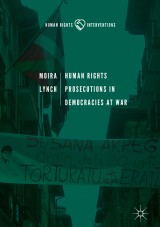Details

Human Rights Prosecutions in Democracies at War
Human Rights Interventions
|
74,89 € |
|
| Verlag: | Palgrave Macmillan |
| Format: | |
| Veröffentl.: | 17.09.2018 |
| ISBN/EAN: | 9783319969084 |
| Sprache: | englisch |
Dieses eBook enthält ein Wasserzeichen.
Beschreibungen
Though many of the longest and most devastating internal armed conflicts have been fought within the boundaries of democratic states, these countries employ some of the highest numbers of human rights prosecutions. What conditions prompt this outcome and what explains the variable patterns of prosecutions in democracies at war? Prosecutions may be enabled by existing democratic norms and institutions, but given their role in a violent conflict, democratic governments may go to great lengths to avoid judicial accountability. Through qualitative and quantitative research of four cases, Sri Lanka, Northern Ireland, Spain and Colombia, this book argues that emergency and anti-terrorism laws issued during the conflict created barriers to the investigation and prosecution of state human rights violations. The extent to which state actors were held accountable was shaped by citizens, NGOs and political actors who challenged or upheld impunity provisions within emergency legislation.
1. Introduction.- 2. Human Rights Prosecutions and Institutional Continuity in Sri Lanka.- 3. Conversion, Layering and Human Rights Prosecutions in Northern Ireland.- 4. “Resorting to Authoritarian Habits”: Anti-Terrorism Laws, State Violence and Human Rights Prosecutions in Democratic Spain.- 5. The Constitutional Court, Military Jurisdiction and Human Rights Prosecutions in Colombia.- 6. Human Rights Prosecutions and Democracies at War in Comparative Perspective.
<b>Moira Lynch</b> is Assistant Professor in the Department of Political Science at Loyola University Maryland, USA.<div><br></div>
<div>Though many of the longest and most devastating internal armed conflicts have been fought within the boundaries of democratic states, these countries employ some of the highest numbers of human rights prosecutions. What conditions prompt this outcome and what explains the variable patterns of prosecutions in democracies at war? Prosecutions may be enabled by existing democratic norms and institutions, but given their role in a violent conflict, democratic governments may go to great lengths to avoid judicial accountability. Through qualitative and quantitative research of four cases, Sri Lanka, Northern Ireland, Spain and Colombia, this book argues that emergency and anti-terrorism laws issued during the conflict created barriers to the investigation and prosecution of state human rights violations. The extent to which state actors were held accountable was shaped by citizens, NGOs and political actors who challenged or upheld impunity provisions within emergency legislation.</div><div><br></div><div><b>Moira Lynch</b> is Assistant Professor in the Department of Political Science at Loyola University Maryland, USA.</div><div><br></div>
Offers a distinctive voice to current debates within the field of transitional justice Draws on theories of comparative politics, transitional justice, human rights and emergency law Illustrates that the tension between democratic governance and emergency law is not a new phenomenon
“This book breaks new ground on questions of human rights accountability in democracies at war. Drawing on illuminating on-site interviews, extensive archival research, and quantitative data, Lynch compellingly argues that emergency laws crucially shape justice outcomes. An impressive contribution.” (Nadya Nedelsky, Professor of International Studies, Macalester College, USA)
Diese Produkte könnten Sie auch interessieren:

How Insights from Moral Psychology and Character Research can aid Development Cooperation

von: Jan Prothmann

13,99 €















